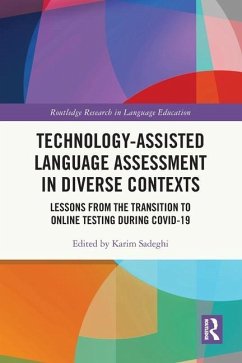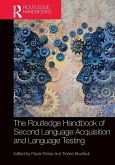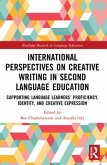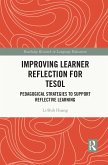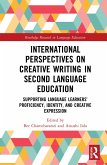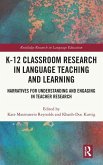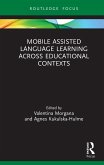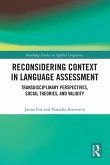Technology-Assisted Language Assessment in Diverse Contexts
Lessons from the Transition to Online Testing during COVID-19
Herausgeber: Sadeghi, Karim
Technology-Assisted Language Assessment in Diverse Contexts
Lessons from the Transition to Online Testing during COVID-19
Herausgeber: Sadeghi, Karim
- Broschiertes Buch
- Merkliste
- Auf die Merkliste
- Bewerten Bewerten
- Teilen
- Produkt teilen
- Produkterinnerung
- Produkterinnerung
This collection explores the role of digital technology in language education and assessment during the COVID-19 pandemic. It recognizes the unique pressures placed on assessment in language education, the forced shift in assessment strategies to go online, the existing shortfalls, the unique affordances of technology-assisted L2 assessment.
Andere Kunden interessierten sich auch für
![The Routledge Handbook of Second Language Acquisition and Language Testing The Routledge Handbook of Second Language Acquisition and Language Testing]() The Routledge Handbook of Second Language Acquisition and Language Testing49,99 €
The Routledge Handbook of Second Language Acquisition and Language Testing49,99 €![International Perspectives on Creative Writing in Second Language Education International Perspectives on Creative Writing in Second Language Education]() International Perspectives on Creative Writing in Second Language Education42,99 €
International Perspectives on Creative Writing in Second Language Education42,99 €![Improving Learner Reflection for TESOL Improving Learner Reflection for TESOL]() Li-Shih HuangImproving Learner Reflection for TESOL39,99 €
Li-Shih HuangImproving Learner Reflection for TESOL39,99 €![International Perspectives on Creative Writing in Second Language Education International Perspectives on Creative Writing in Second Language Education]() International Perspectives on Creative Writing in Second Language Education142,99 €
International Perspectives on Creative Writing in Second Language Education142,99 €![K-12 Classroom Research in Language Teaching and Learning K-12 Classroom Research in Language Teaching and Learning]() K-12 Classroom Research in Language Teaching and Learning152,99 €
K-12 Classroom Research in Language Teaching and Learning152,99 €![Mobile Assisted Language Learning Across Educational Contexts Mobile Assisted Language Learning Across Educational Contexts]() Mobile Assisted Language Learning Across Educational Contexts53,99 €
Mobile Assisted Language Learning Across Educational Contexts53,99 €![Reconsidering Context in Language Assessment Reconsidering Context in Language Assessment]() Janna FoxReconsidering Context in Language Assessment42,99 €
Janna FoxReconsidering Context in Language Assessment42,99 €-
-
-
This collection explores the role of digital technology in language education and assessment during the COVID-19 pandemic. It recognizes the unique pressures placed on assessment in language education, the forced shift in assessment strategies to go online, the existing shortfalls, the unique affordances of technology-assisted L2 assessment.
Hinweis: Dieser Artikel kann nur an eine deutsche Lieferadresse ausgeliefert werden.
Hinweis: Dieser Artikel kann nur an eine deutsche Lieferadresse ausgeliefert werden.
Produktdetails
- Produktdetails
- Routledge Research in Language Education
- Verlag: Taylor & Francis Ltd
- Seitenzahl: 274
- Erscheinungstermin: 30. Dezember 2022
- Englisch
- Abmessung: 229mm x 152mm x 15mm
- Gewicht: 408g
- ISBN-13: 9781032117690
- ISBN-10: 1032117699
- Artikelnr.: 65889658
- Herstellerkennzeichnung
- Libri GmbH
- Europaallee 1
- 36244 Bad Hersfeld
- gpsr@libri.de
- Routledge Research in Language Education
- Verlag: Taylor & Francis Ltd
- Seitenzahl: 274
- Erscheinungstermin: 30. Dezember 2022
- Englisch
- Abmessung: 229mm x 152mm x 15mm
- Gewicht: 408g
- ISBN-13: 9781032117690
- ISBN-10: 1032117699
- Artikelnr.: 65889658
- Herstellerkennzeichnung
- Libri GmbH
- Europaallee 1
- 36244 Bad Hersfeld
- gpsr@libri.de
Karim Sadeghi is a Professor of TESOL at Urmia University, Iran. He is the founding editor-in-chief of the Iranian Journal of Language Teaching Research.
Foreword by Paula Winke
Section I: Theoretical and Methodological Concerns in Online L2 Assessment
Chapter 1: Technology in language assessment: An overview
Karim Sadeghi
Chapter 2: Seeking empirical evidence to support online test validation:
Building on the IELTS Indicator assessment model
Tony Clark, Martine Holland, and Richard Spiby
Chapter 3: Emergency remote assessment (ERA) narratives from the UK English
for Academic Purposes (EAP) sector: Examining validity and longevity of
technology-driven solutions
Emma Bruce and Heléna Stakounis
Chapter 4: Language testing and assessment in COVID-19 pandemic crisis
Hossein Farhady
Chapter 5: Argument-based validation in the time of the COVID-19 pandemic
Erik Voss
Chapter 6: Assessment without borders: Modernising placement tests for
diverse contexts
Mahmoud Amer and María J. Cabrera-Puche
Section II: Reactions to L2 E-Assessment During the Covid-19 Pandemic
Chapter 7: Responding to the pandemic in New Zealand: Opportunities and
challenges for language assessment in one tertiary institution
Martin East, Deborah Walker-Morrison, and Viviane Lelièvre-Lopes
Chapter 8: Online remote (at-home) assessment of language modules during
COVID-19: Changes, challenges, and students' perceptions
Isabel Balteiro
Chapter 9: Assessing university students' writing development and
performance during remote instruction
Bahiyyih Hardacre
Chapter 10: Fairness in remote English placement testing at Iowa State
University during the COVID-19 pandemic
Reza Neiriz, Shireen Baghestani, Ananda Astrini Muhammad, and Jim Ranalli
Chapter 11: Integration of data-driven learning and assessment through a
multimodal corpus of learning objects at the time of the COVID-19 pandemic
María Luisa Carrió-Pastor
Section III: Managing L2 Assessment at the Time of the Crisis: The Way
Forward
Chapter 12: Test usefulness of E-Portfolios: An alternative approach during
and beyond the pandemic
Ricky Lam
Chapter 13: Can interactions happen across the screens?: The use of
videoconferencing technology in assessing second language pragmatic
competence
Shishi Zhang and Talia Isaacs
Chapter 14: The use of technology for redesigning L2 language assessments:
Tasks, rubrics, and feedback in emergency remote teaching contexts
Ana Maria Ducasse
Chapter 15: Rethinking the online placement test for a college-level
Japanese language program during the COVID-19 pandemic
Akiko Imamura, Catherine Ryu, and Mariko Kawaguchi
Chapter 16: Conclusion: Lesson learned and lessons not learned
Karim Sadeghi
Section I: Theoretical and Methodological Concerns in Online L2 Assessment
Chapter 1: Technology in language assessment: An overview
Karim Sadeghi
Chapter 2: Seeking empirical evidence to support online test validation:
Building on the IELTS Indicator assessment model
Tony Clark, Martine Holland, and Richard Spiby
Chapter 3: Emergency remote assessment (ERA) narratives from the UK English
for Academic Purposes (EAP) sector: Examining validity and longevity of
technology-driven solutions
Emma Bruce and Heléna Stakounis
Chapter 4: Language testing and assessment in COVID-19 pandemic crisis
Hossein Farhady
Chapter 5: Argument-based validation in the time of the COVID-19 pandemic
Erik Voss
Chapter 6: Assessment without borders: Modernising placement tests for
diverse contexts
Mahmoud Amer and María J. Cabrera-Puche
Section II: Reactions to L2 E-Assessment During the Covid-19 Pandemic
Chapter 7: Responding to the pandemic in New Zealand: Opportunities and
challenges for language assessment in one tertiary institution
Martin East, Deborah Walker-Morrison, and Viviane Lelièvre-Lopes
Chapter 8: Online remote (at-home) assessment of language modules during
COVID-19: Changes, challenges, and students' perceptions
Isabel Balteiro
Chapter 9: Assessing university students' writing development and
performance during remote instruction
Bahiyyih Hardacre
Chapter 10: Fairness in remote English placement testing at Iowa State
University during the COVID-19 pandemic
Reza Neiriz, Shireen Baghestani, Ananda Astrini Muhammad, and Jim Ranalli
Chapter 11: Integration of data-driven learning and assessment through a
multimodal corpus of learning objects at the time of the COVID-19 pandemic
María Luisa Carrió-Pastor
Section III: Managing L2 Assessment at the Time of the Crisis: The Way
Forward
Chapter 12: Test usefulness of E-Portfolios: An alternative approach during
and beyond the pandemic
Ricky Lam
Chapter 13: Can interactions happen across the screens?: The use of
videoconferencing technology in assessing second language pragmatic
competence
Shishi Zhang and Talia Isaacs
Chapter 14: The use of technology for redesigning L2 language assessments:
Tasks, rubrics, and feedback in emergency remote teaching contexts
Ana Maria Ducasse
Chapter 15: Rethinking the online placement test for a college-level
Japanese language program during the COVID-19 pandemic
Akiko Imamura, Catherine Ryu, and Mariko Kawaguchi
Chapter 16: Conclusion: Lesson learned and lessons not learned
Karim Sadeghi
Foreword by Paula Winke
Section I: Theoretical and Methodological Concerns in Online L2 Assessment
Chapter 1: Technology in language assessment: An overview
Karim Sadeghi
Chapter 2: Seeking empirical evidence to support online test validation:
Building on the IELTS Indicator assessment model
Tony Clark, Martine Holland, and Richard Spiby
Chapter 3: Emergency remote assessment (ERA) narratives from the UK English
for Academic Purposes (EAP) sector: Examining validity and longevity of
technology-driven solutions
Emma Bruce and Heléna Stakounis
Chapter 4: Language testing and assessment in COVID-19 pandemic crisis
Hossein Farhady
Chapter 5: Argument-based validation in the time of the COVID-19 pandemic
Erik Voss
Chapter 6: Assessment without borders: Modernising placement tests for
diverse contexts
Mahmoud Amer and María J. Cabrera-Puche
Section II: Reactions to L2 E-Assessment During the Covid-19 Pandemic
Chapter 7: Responding to the pandemic in New Zealand: Opportunities and
challenges for language assessment in one tertiary institution
Martin East, Deborah Walker-Morrison, and Viviane Lelièvre-Lopes
Chapter 8: Online remote (at-home) assessment of language modules during
COVID-19: Changes, challenges, and students' perceptions
Isabel Balteiro
Chapter 9: Assessing university students' writing development and
performance during remote instruction
Bahiyyih Hardacre
Chapter 10: Fairness in remote English placement testing at Iowa State
University during the COVID-19 pandemic
Reza Neiriz, Shireen Baghestani, Ananda Astrini Muhammad, and Jim Ranalli
Chapter 11: Integration of data-driven learning and assessment through a
multimodal corpus of learning objects at the time of the COVID-19 pandemic
María Luisa Carrió-Pastor
Section III: Managing L2 Assessment at the Time of the Crisis: The Way
Forward
Chapter 12: Test usefulness of E-Portfolios: An alternative approach during
and beyond the pandemic
Ricky Lam
Chapter 13: Can interactions happen across the screens?: The use of
videoconferencing technology in assessing second language pragmatic
competence
Shishi Zhang and Talia Isaacs
Chapter 14: The use of technology for redesigning L2 language assessments:
Tasks, rubrics, and feedback in emergency remote teaching contexts
Ana Maria Ducasse
Chapter 15: Rethinking the online placement test for a college-level
Japanese language program during the COVID-19 pandemic
Akiko Imamura, Catherine Ryu, and Mariko Kawaguchi
Chapter 16: Conclusion: Lesson learned and lessons not learned
Karim Sadeghi
Section I: Theoretical and Methodological Concerns in Online L2 Assessment
Chapter 1: Technology in language assessment: An overview
Karim Sadeghi
Chapter 2: Seeking empirical evidence to support online test validation:
Building on the IELTS Indicator assessment model
Tony Clark, Martine Holland, and Richard Spiby
Chapter 3: Emergency remote assessment (ERA) narratives from the UK English
for Academic Purposes (EAP) sector: Examining validity and longevity of
technology-driven solutions
Emma Bruce and Heléna Stakounis
Chapter 4: Language testing and assessment in COVID-19 pandemic crisis
Hossein Farhady
Chapter 5: Argument-based validation in the time of the COVID-19 pandemic
Erik Voss
Chapter 6: Assessment without borders: Modernising placement tests for
diverse contexts
Mahmoud Amer and María J. Cabrera-Puche
Section II: Reactions to L2 E-Assessment During the Covid-19 Pandemic
Chapter 7: Responding to the pandemic in New Zealand: Opportunities and
challenges for language assessment in one tertiary institution
Martin East, Deborah Walker-Morrison, and Viviane Lelièvre-Lopes
Chapter 8: Online remote (at-home) assessment of language modules during
COVID-19: Changes, challenges, and students' perceptions
Isabel Balteiro
Chapter 9: Assessing university students' writing development and
performance during remote instruction
Bahiyyih Hardacre
Chapter 10: Fairness in remote English placement testing at Iowa State
University during the COVID-19 pandemic
Reza Neiriz, Shireen Baghestani, Ananda Astrini Muhammad, and Jim Ranalli
Chapter 11: Integration of data-driven learning and assessment through a
multimodal corpus of learning objects at the time of the COVID-19 pandemic
María Luisa Carrió-Pastor
Section III: Managing L2 Assessment at the Time of the Crisis: The Way
Forward
Chapter 12: Test usefulness of E-Portfolios: An alternative approach during
and beyond the pandemic
Ricky Lam
Chapter 13: Can interactions happen across the screens?: The use of
videoconferencing technology in assessing second language pragmatic
competence
Shishi Zhang and Talia Isaacs
Chapter 14: The use of technology for redesigning L2 language assessments:
Tasks, rubrics, and feedback in emergency remote teaching contexts
Ana Maria Ducasse
Chapter 15: Rethinking the online placement test for a college-level
Japanese language program during the COVID-19 pandemic
Akiko Imamura, Catherine Ryu, and Mariko Kawaguchi
Chapter 16: Conclusion: Lesson learned and lessons not learned
Karim Sadeghi

